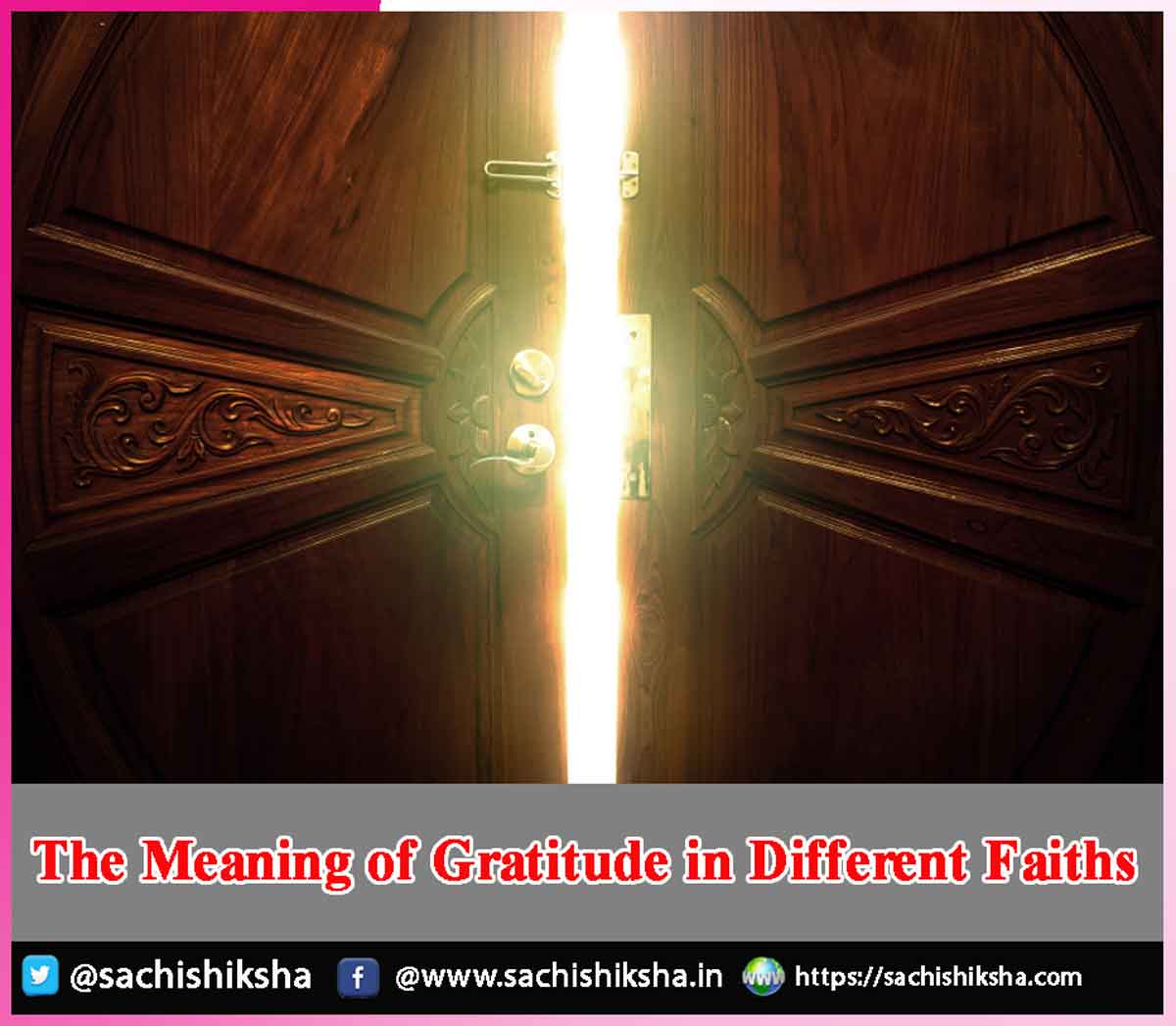The Meaning of Gratitude in Different Faiths
Introduction: Gratitude is a universal value cherished across cultures and civilizations. It embodies an appreciation for life’s blessings, whether they are tangible or intangible.

Table of Contents
Gratitude in Christianity
In Christianity, gratitude is central to the believer’s relationship with God. The Bible is filled with teachings and examples that emphasize thankfulness as an integral part of worship and daily living.
Biblical Teachings on Gratitude:
Scriptures such as 1 Thessalonians 5:18 encourage Christians to “give thanks in all circumstances; for this is God’s will for you in Christ Jesus.” This verse highlights the idea that gratitude should be continuous, regardless of life’s challenges. It signifies trust in God’s plan and acknowledgment of His goodness and mercy.
Gratitude in Prayer and Worship:
Christians express gratitude through prayers, hymns, and acts of worship. The practice of giving thanks is embedded in the Eucharist (or Holy Communion), which is derived from the Greek word eucharistia, meaning “thanksgiving.” This sacrament commemorates Jesus’ sacrifice and serves as a reminder of God’s boundless love.
The Role of Gratitude in Daily Life:
For many Christians, gratitude is not only shown during formal worship but is a daily practice that shapes their interactions and perspective on life. Acts of charity, kindness, and service to others are seen as extensions of thankfulness for God’s blessings.
Gratitude in Islam
Gratitude, or shukr, holds profound significance in Islam. It reflects a Muslim’s acknowledgment of Allah’s blessings and serves as a form of worship.
- Quranic Perspective: The Quran emphasizes the importance of gratitude in verses such as Surah Ibrahim (14:7): “If you are grateful, I will surely increase you [in favour].” This indicates that gratitude is not just a virtue but a means to receive more blessings. Muslims are encouraged to show thankfulness for both major and minor favours from Allah.
- Gratitude in Practice: Muslims express gratitude through prayers (dua) and daily acts of remembrance (dhikr). The phrase Alhamdulillah (meaning “Praise be to God”) is commonly recited to express thankfulness for everything from life’s grand blessings to simple, everyday occurrences.
- Fasting and Gratitude: The act of fasting during Ramadan is an example of how gratitude is practiced in Islam. By abstaining from food and drink, Muslims are reminded of the struggles of the less fortunate, fostering a sense of appreciation for their own blessings and encouraging empathy and generosity toward others.
Gratitude in Judaism
In Judaism, gratitude is a foundational concept that permeates religious practice, ethics, and daily life. It emphasizes recognizing God as the source of all goodness and showing appreciation for His provision.
- The Shema and Daily Prayers: The Shema, a central prayer in Jewish liturgy, underscores the idea of devotion and gratitude to God. Jews also begin their day with Modeh Ani, a prayer recited upon waking that thanks God for the gift of life. This sets the tone for a day lived in acknowledgment of divine favour.
- Festivals and Gratitude: Jewish holidays often incorporate themes of gratitude. For instance, Sukkot, the Feast of Tabernacles, is a festival of thanksgiving for the harvest and a reminder of the Israelites’ reliance on God during their journey in the desert.
- Gratitude in Ethical Teachings: The Jewish emphasis on gratitude extends to interactions with others. Jewish teachings advocate for acts of kindness and recognizing the help of others, as seen in the concept of Hakarat Ha Tov (recognizing the good). This ethical principle encourages individuals to express appreciation to both God and fellow humans.
Gratitude in Hinduism
Hinduism, with its deep spiritual traditions, incorporates gratitude as a key component of devotion and philosophy of life. The practice of gratitude is linked to humility, contentment, and the acknowledgment of divine presence in all aspects of life.
- Scriptural Insights: Texts like the Bhagavad Gita emphasize devotion and thankfulness as paths to spiritual growth. Krishna advises Arjuna to approach life with humility and gratitude, understanding that every experience is part of a larger divine plan.
- Rituals and Offerings: Gratitude in Hinduism is expressed through rituals, prayers, and offerings. Devotees often present flowers, food, or water to deities as a way of giving thanks. Temples and personal shrines serve as focal points for such expressions of gratitude.
- Daily Practices: Gratitude is a part of daily life through practices like meditation, chanting mantras, and the Namaste greeting, which signify respect and acknowledgment of the divine in others. Festivals such as Diwali, which celebrates the victory of light over darkness, also carry an underlying theme of thankfulness for the blessings of life and knowledge.
Gratitude in Buddhism
In Buddhism, gratitude is linked to mindfulness, contentment, and a deep appreciation for life’s present moment. It forms an essential aspect of cultivating a peaceful and fulfilling existence.
- Mindfulness and Gratitude: The practice of mindfulness in Buddhism encourages awareness and appreciation of the present. Buddhists are taught to be thankful for the moment and to acknowledge the interconnectedness of all life. The Metta bhavana (loving-kindness meditation) often includes expressions of gratitude towards oneself and others, fostering a compassionate worldview.
- The Role of Teachers and Sangha: Buddhists show gratitude for their spiritual teachers (gurus) and the Sangha (community of monks and practitioners). This acknowledgment strengthens bonds within the community and reinforces the value of shared wisdom and support.
- Acceptance and Gratitude: The teachings of impermanence and non-attachment encourage Buddhists to appreciate what they have without clinging to it. Gratitude, therefore, becomes a practice of accepting life as it is, fostering a sense of peace and contentment.
Gratitude in Indigenous and Other Spiritual Traditions

- Native American Spirituality: Gratitude is deeply ingrained in Native American traditions, where rituals often involve giving thanks to the Earth, animals, and natural elements. Ceremonies like the Sun Danceor, Thanksgiving feasts involve prayers of gratitude to the Creator for providing sustenance and life.
- African Traditional Religions: In many African cultures, gratitude is expressed through music, dance, and communal celebrations. These acts honour ancestors and deities believed to be instrumental in providing blessings and protection.
Common Threads and Unique Expressions
While each faith & tradition has unique expressions of gratitude, common themes emerge:
- Recognition of a Higher Power: Most faiths link gratitude to a higher power or divine source, emphasizing that life’s blessings are gifts rather than entitlements.
- Community and Shared Values: Gratitude often fosters a sense of unity and strengthens communal bonds, whether through group prayers, festivals, or rituals.
- Daily Practices and Reflections: Regular expressions of gratitude, whether through prayer, meditation, or ethical behaviour are common across religions, shaping how adherents live their daily lives.
Conclusion
Gratitude, as viewed by different faiths, is more than a simple acknowledgment of blessings; it is an integral practice that shapes beliefs, behaviour, and worldview. Whether expressed through prayer, meditation, rituals, or acts of service, gratitude remains a powerful, unifying force that transcends cultural and religious boundaries. By embracing gratitude, individuals find deeper meaning in their spiritual paths and a greater appreciation for life itself.















































